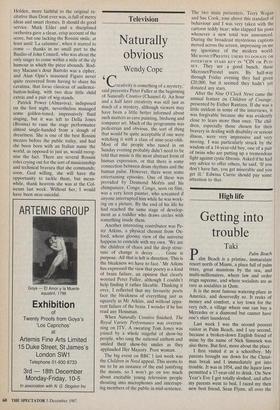Opera
Tosca (Covent Garden)
Assorted bravura
Rodney Milnes
It's been a rum fortnight, one that should have shown both London's opera houses at their best, but somehow didn't. There is still plenty of life in the 23-year-old Zef- firelli Tosca; it survives to fulfil its 'interna- tional opera house' function as a showcase for visiting international singers, in this case a Hungarian, a Czech and a Swede. (No Italians, alas.) All three provided incidental pleasures, especially Eva Mar- ton in the title role, but pleasures that failed to add up to anything approaching a serious performance of what may, or may not, be a serious opera. (I happen to think it is, but then we all have problems.) Miss Marton has a fabulous voice and a strikingly handsome presence. She com- mands the stage completely, almost to a fault, given that Puccini's songstress is only another of his doomed little women, albeit one who happens to be required to make a great deal of noise. For all her hugely winning and sympathetic qualities, Miss Marton is about as vulnerable as a Sher- man tank, and when in the second act she went for Scarpia long before the murder and nearly sent the poor chap flying, you felt that the thread of the narrative had somehow got lost. Never mind, hearing the role sung with such bravura and musi- cianship — the opening of Nissi d'arte' was exquisitely shaped, and the end might have been as well with some support from the conductor — reminded one what inter- national opera houses are for.
In the pit was Giuseppe Sinopoli, whose international career is something of a mystery. He started as a composer of limited renown, turned to conducting, and was taken up by Deutsche Grammophon and, amongst others, the Philharmonia. His appearances here divide critics in the proportion of about six to one, the major- ity angrily incredulous at his reputation, the minority dubbing him an original inter- pretative talent. Me, I just think he isn't any good. He chopped Tosca into little pieces, teased some out, hustled through others, and in general never left a hitherto foolproof score well alone. The pieces failed to come together again, all sense of dramatic flow was lost, and his self- indulgent ways caused the poor singers no end of problems. Rather than re-compose other people's music, he should perhaps return to his own.
After my light-hearted — huh! — teas- ing of a fortnight ago, it would be proper to hail Jonathan Miller's ENO Barber as a masterpiece of wit and style. Sadly it is not: tired old school-of-funny-walks direction is a substitute for neither quality. It was astonishing to see Miller so often at an apparent loss to know what to do next, and having the captain of the watch conducting the first-act finale was only one of several ghastly ideas to fill far too many gaps. Worst of all, this was the first Barber in dozens and dozens that I found actively boring, which has never been the case even with umpteenth revivals of ancient and bewhiskered stagings. The ENO one that this replaces was a miracle of invention by comparison. Lighting and design were also way below the house's high standards.
There were some compensations. The new translation by Amanda and Anthony Holden, more faithful to the original re- citative than Dent ever was, is full of merry ideas and smart rhymes. It should do good service. Mark Elder and a disciplined orchestra gave a clean, crisp account of the score, but one lacking the Rossini smile, at least until 'La calunnia', when it started to come — thanks in no small part to the Basilio of John Connell, who was about the only singer to come within a mile of the sly humour in which the piece abounds. Rod- ney Macann's dour Bartolo was a cipher, and Alan Opie's seasoned Figaro never quite recovered from having to share his cavatina, that locus classicus of audience- button-holing, with two dear little child extras and a pair of wig-stands.
Patrick Power (Almaviva), indisposed on the first night, nevertheless managed some golden-toned, impressively fluid singing, but it was left to Della Jones (Rosina) to raise the stage performance almost single-handed from a slough of dreariness. She is one of the best Rossini mezzos before the public today, and had she been born with an Italian name the world, as opposed to just us, would recog- nise the fact. There are several Rossini roles crying out for the sort of musicianship and technical bravura that she commands; soon, God willing, she will have the opportunity to tackle them, but mean- while, thank heavens she was at the Col- iseum last week. Without her, I would have been near-suicidal.











































































 Previous page
Previous page